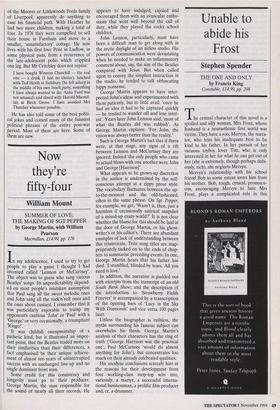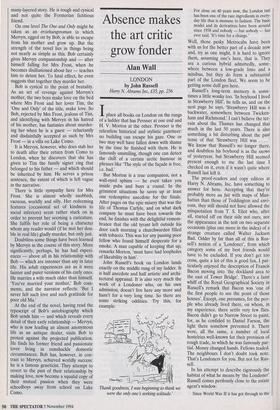Unable to abide his Frost
Stephen Spender
THE ONE AND ONLY by Francis King Constable, f14.99, pp. 208 The central character of this novel is a spoiled and silly woman, Mrs Frost, whose husband is a neurasthenic first world war victim. They have a son, Mervyn, the narra- tor, who tries his inadequate best to be kind to his father. In her pursuit of her vacuous toyboy lover Tim, who is only interested in her for what he can get out of her (she is extremely, though perhaps dubi- ously, rich), she neglects Mervyn.
Mervyn's relationship with his school friend Bob to some extent saves him from his mother. Bob, tough, cynical, promiscu- ous, encouraging Mervyn to hate Mrs Frost, plays a complicated role in this many-layered story. He is tough and cynical and not quite the Forsterian fictitious friend.
On one level The One and Only might be taken as an erziehungsroman in which Mervyn, egged on by Bob, is able to escape from his mother and grow up. But the strength of the novel lies in things being not nearly as simple as this. Bob certainly gives Mervyn companionship and — after himself falling for Mrs Frost, when he becomes disillusioned about her — teaches him to detest her. To fatal effect, he even suggests that together they murder her.
Bob is cynical to the point of brutality. As an act of revenge against Mervyn's mother, the two boys make love on the bed where Mrs Frost and her lover Tim, the `One and Only' of the title, make love. So Bob, rejected by Mrs Frost, jealous of Tim, and identifying with Mervyn in his hatred of his mother, has fantasies about murder- ing her when he is a guest — reluctantly and disdainfully accepted as such by Mrs Frost — in a villa on Lake Como.
It is Mervyn, however, who does stab her to death after their return from Como to London, when he discovers that she has given to Tim the family signet ring that belonged to his father — and which should be inherited by him. He serves a prison sentence, the extent of which is left vague in the narrative.
There is little sympathy here for Mrs Frost. She is almost wholly snobbish, vacuous, worldly and silly. Her redeeming features (occasional act of kindness to social inferiors) seem rather stuck on in order to prevent her seeming a caricature. She fulfils her role of being a character whom any reader would (if he met her dou- ble in real life) gladly murder, but only just.
Doubtless some things have been learned by Mervyn in the course of this story. More significantly, perhaps, he has had experi- ences — above all in his relationship with Bob — which are intenser than any in later life. His adult experiences are as it were fainter and purer versions of his early ones. He marries a wife much older than himself. `You've married your mother,' Bob com- ments, and the narrator reflects: 'But I never felt such love and such gratitude for poor old Ma.'
At the end of the novel, having read the typescript of Bob's autobiography which Bob sends him — and which reveals every detail of their early relationship — Mervyn, who is now leading an almost anonymous life as an antique dealer, visits Bob to protest against the projected publication. He finds his former friend and passionate lover living in ramshackle domestic circumstances. Bob has, however, in con- trast to Mervyn, achieved worldly success: he is a famous geneticist. They attempt to revert to the past of their relationship by making love, now become a squalid copy of their mutual passion when they were schoolboys away from school on Lake Como.











































































 Previous page
Previous page